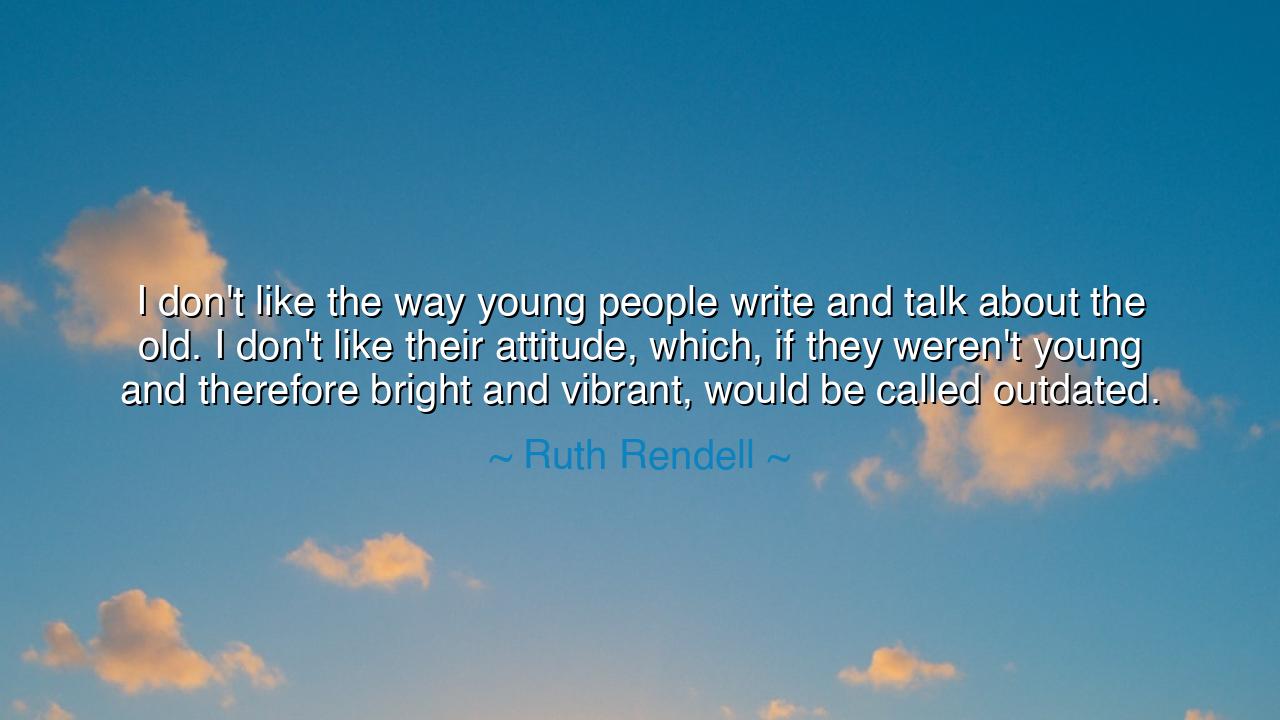
I don't like the way young people write and talk about the old. I
I don't like the way young people write and talk about the old. I don't like their attitude, which, if they weren't young and therefore bright and vibrant, would be called outdated.






Host: The dim light of the evening casts long shadows across the room, the soft glow from the lamp gently illuminating the space. Jack sits with his arms crossed, his expression serious as he ponders Ruth Rendell’s words. Jeeny, sitting across from him, is relaxed but attentive, her gaze focused, waiting for the right moment to speak. The quiet between them feels heavy, the weight of the quote sinking in.
Jack: (his voice tinged with frustration) "You know, Ruth Rendell’s quote about young people and their attitude toward the old really hits me. She talks about how young people write and talk about older generations as if their perspective is outdated. And, honestly, I get it. It’s like we’re in this culture where youth is seen as the pinnacle of everything—bright, vibrant, while anything that’s older is dismissed. But where’s the respect for experience, for the knowledge that comes with age?"
Jeeny: (leaning forward slightly, her voice thoughtful) "I think what Rendell is trying to highlight is the disrespect that comes with the assumption that youth is always right, always relevant. It’s easy to dismiss older generations when you haven’t lived through the same challenges, when you haven’t accumulated the same wisdom. But that doesn’t mean the older generation’s perspectives are outdated. There’s a richness in experience that youth simply hasn’t had the time to gain yet."
Jack: (nodding, his voice a little softer) "Exactly. It feels like, today, we’ve turned youth into this kind of golden standard, but that doesn’t mean older generations don’t have value. We talk about innovation and change, but we forget that so much of that innovation comes from building on what came before us. It's like we’ve lost sight of the importance of learning from those who’ve been there, who’ve lived through the things we only hear about."
Jeeny: (smiling slightly, her tone compassionate) "There’s a difference between evolving and disrespecting. Change is necessary, but that doesn’t mean we should ignore what we can learn from the past. The older generation has witnessed things, survived things, built foundations that we stand on today. We’re always looking forward, which is good, but if we don’t recognize the wisdom of the past, we risk repeating mistakes or missing out on insights that could guide us."
Host: The room seems to settle into a quiet reflection, Jack’s brow furrowed, his thoughts still swirling. Jeeny sits patiently, her presence calm, as the conversation lingers in the air between them.
Jack: (pauses, voice thoughtful) "I guess what frustrates me is that there’s this assumption that older people are irrelevant in today’s world, like their experience doesn’t matter anymore. But we’re constantly trying to build something new, and how can we do that without respecting the past? Without learning from those who’ve come before us?"
Jeeny: (softly, her voice firm) "Exactly. There’s a difference between stagnation and learning. Just because things change doesn’t mean we should discard everything that came before. Balance is what’s important—appreciating the freshness and vitality that youth brings while also respecting the depth and context that older generations offer. That’s where true growth happens—when both sides meet, when both perspectives are valued."
Jack: (nodding, his voice more resolved) "I get it now. It’s not about choosing one over the other. It’s about honoring both—the energy of youth and the wisdom of age. Without that balance, we lose something important."
Jeeny: (smiling gently) "Yes, exactly. And that’s the beauty of generations working together. It’s not about rejecting what came before—it’s about embracing it while moving forward. The older generation has so much to offer, and the younger generation has so much to teach as well. Together, we move forward stronger."
Host: The air in the room feels lighter now, the weight of the conversation shifting from frustration to understanding. Jack leans back in his chair, a small smile forming on his face, while Jeeny sits across from him, the quiet understanding between them settling like a soft breath. The conversation, like the passing of time itself, flows in cycles—each generation with something to offer, and each one learning from the last.






AAdministratorAdministrator
Welcome, honored guests. Please leave a comment, we will respond soon